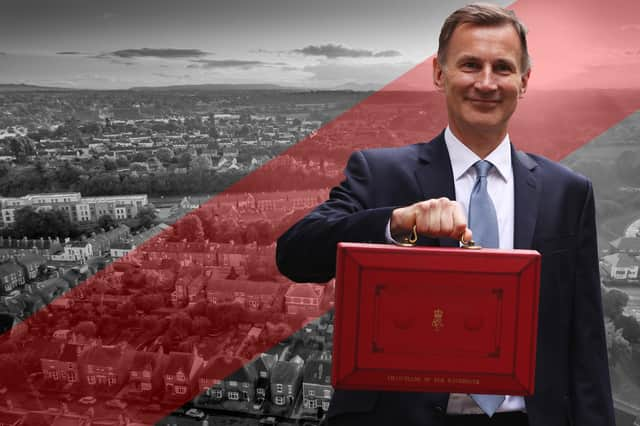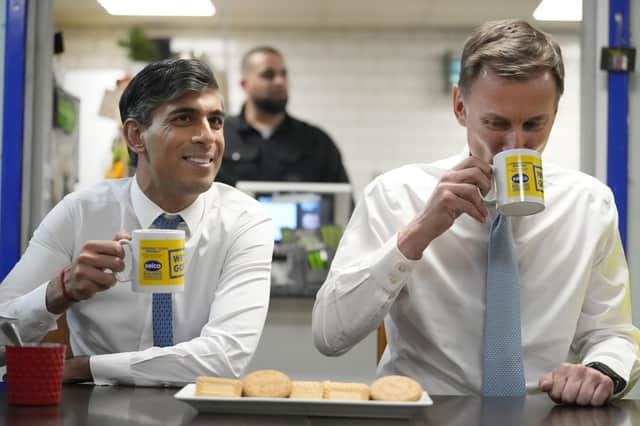Budget 2024: four key takeaways from Jeremy Hunt’s spring statement from child benefit to housing
and live on Freeview channel 276
Jeremy Hunt has announced his final Budget before the next general election, hoping to give the flailing Tories a poll boost.
The Chancellor announced another National Insurance cut - just like the Autumn Statement - as he once again pledged that the Budget would stimulate growth. He told MPs that “we can now help families not just with temporary cost-of-living support but with permanent cuts in taxation”.
However, Labour’s Rachel Reeves said: “The Chancellor’s Budget has lifted the lid on 14 years of Tory economic failure. Taxes are still rising, prices are still going up in the shops, and mortgages are higher.”
Here are the key points from the Budget that you need to know.


National Insurance cut disguises that overall people are paying more tax
At what point in his statement, Jeremy Hunt looked at the opposition benches and said: "A tax cutting budget is very uncomfortable for the biggest tax risers in the UK." For what was supposed to be a barb at Labour it slightly backfired, with MPs shouting at the Chancellor: “That’s you.”
Today, Hunt cut National Insurance once again by two percentage points and also cut capital gains tax and froze fuel and alcohol duty. However, in this last Parliament there was been a record amount of tax rises and the Office for Budget Responsibility forecasts that the tax burden (compared with GDP) will reach its highest level since the 1940s.
So while Hunt has cut National Insurance, as people’s incomes rise with inflation they get pulled into higher tax thresholds - due to something called fiscal drag. The OBR says that every year from 2024/25 more than five million people will move up a tax band, in what people have described as a stealth tax rise, while Labour says families will be £870 worse off due to this.
Child benefit changes are much needed
Almost all of the Budget had been trailed in advance in the newspapers, however the only real rabbit out of the hat was reform to child benefit. This was not something which had been briefed out, however is much needed to end a drastically unfair system which particularly penalises single parents.
Currently, the system is based around the highest earner - so if one parent earns above £50,000 they have to start paying back part of their child benefit. This means that if one parent earns above the threshold and the other parent is not working, the couple would be subject to the child benefit charge. However, if both parents earned £49,999 they would receive their child benefit in full - despite their combined income being almost double that of the previous example.
Hunt said he would alter child benefit so it is calculated based on the household income. This will not be introduced until April 2026 as it is a complex reform of the tax system. In the meantime Hunt announced he was increasing the threshold at which the high income child benefit charge starts from £50,000 to £60,000.


U-turn on non-dom copying Labour
In 2023, Jeremy Hunt said that abolishing the non-dom tax exemption, for wealthy people who reside in a number of countries, was “wrong” and would cost the exchequer money. This was after Labour announced it as a policy to fund a number of public spending initiatives including on the NHS.
However now it appears the Chancellor has changed his mind. Hunt said: “I have always believed that provided we protect the UK’s attractiveness to international investors, those with the broadest shoulders should pay their fair share. After looking at the issue over many months, I have concluded that we can indeed introduce a system which is both fairer and remains competitive with other countries.”


It will be interesting to see what has dramatically changed in a year - other than laying a trap for the opposition in an election year. Labour described it as a “humiliating U-turn”, with a spokesman saying: “Both Jeremy Hunt and Rishi Sunak have been repeatedly on the record opposing the reverse on non-doms, and if the government had introduced those changes two years ago, when we first called for them, billions of pounds more would have been available for our public services, including the NHS.”
What’s more the Prime Minister had to recuse himself from the discussions, due to his wife Akshata Murthy previously claiming non-dom tax relief. Overall, much of the Chancellor’s speech seemed to be focused on attacking the Labour Party instead of announcing new policies - perhaps he’s running out of ideas.
Housing: nothing for first-time buyers or planning
On housing, Hunt announced the extension of the Household Support Fund and a reduction in the top rate of capital gains tax for residential sales, however there was nothing to help first-time buyers or property owners hit by sky-high interest rates. The Chancellor also gave minimal attention to the planning system, which critics say is blocking housebuilding and slowing down growth.
Lenders expressed their concern. Henry Jordan, director of home at Nationwide Building Society, said: “As an organisation whose purpose it is to support people into a home of their own, we are disappointed that the Chancellor hasn’t announced any substantial measures to support first-time buyers in today’s spring Budget.
“Nationwide continues to call for a Government-commissioned, independently-chaired review of the first-time buyer market – this is needed to help government produce a sustainable long-term strategy to support people hoping to purchase a property.”
While Brian Byrnes, head of personal finance at Moneybox said: “Today’s Budget was a missed opportunity to provide some much-needed support and reassurance to all those currently saving towards buying a home of their own someday. Without a doubt, getting that first foot on the property ladder has become increasingly difficult in recent years, with rising costs of living and increased affordability challenges.”
Ralph Blackburn is NationalWorld’s politics editor based in Westminster, where he gets special access to Parliament, MPs and government briefings. If you liked this article you can follow Ralph on X (Twitter) here and sign up to his free weekly newsletter Politics Uncovered, which brings you the latest analysis and gossip from Westminster every Sunday morning.
Comment Guidelines
National World encourages reader discussion on our stories. User feedback, insights and back-and-forth exchanges add a rich layer of context to reporting. Please review our Community Guidelines before commenting.
